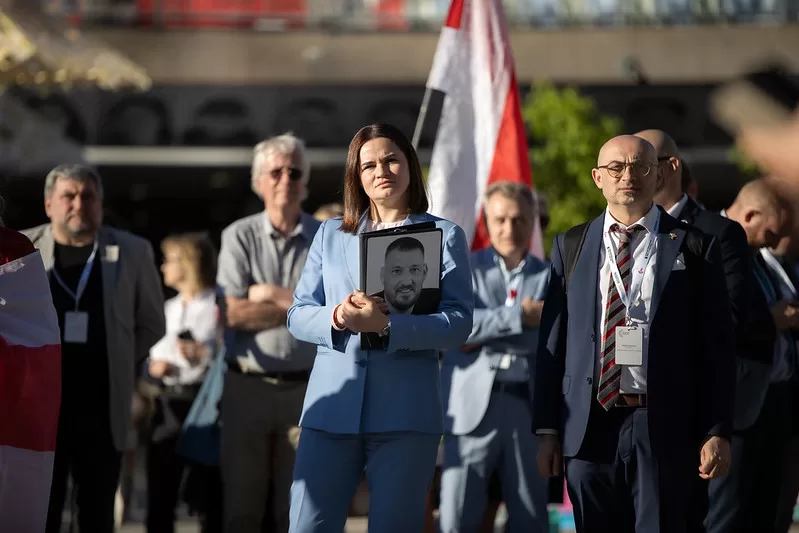As Belarus approaches the 30th anniversary of Aliaksandr Lukashenka’s autocratic rule, repression by the regime against those who stand for democracy and freedom is not getting any less severe.
This summer marks three decades since Lukashenka’s first inauguration and four years since the Belarusian pro-democratic revolution erupted following his controversial 2020 presidential election win over political newbie Sviatlana Tsikhanouskaya. Despite the ongoing democratic movement led by Tsikhanouskaya, which keeps Belarus on the international agenda, the regime relentlessly cracks down on civil society both inside the country and in exile.
As of today, more than 1,400 political prisoners are behind bars in Belarus. During a recent visit to Washington, Tsikhanouskaya highlighted the scale of the repression by comparing these 1,400 prisoners to what would be 45,000 political prisoners in the United States. Many activists argue that support for Belarusians who flee their homeland could be stronger. Maria Rudz, co-chair of Razam, a Belarusian diaspora group in Germany, reported that out of 1,000 asylum applications from Belarusians, only 40 received positive decisions.
It is also crucial to remember that those jailed on politically motivated charges in Belarus endure inhumane treatment in prisons. Many imprisoned leaders of the pro-democratic movement are held incommunicado: Siarhei Tsikhanouski for 471 days, Maryia Kalesnikava for over 493 days, Mikalai Statkevich for 498 days, Maksim Znak for 499 days, and Viktar Babaryka for 502 days. Lukashenka is acutely aware that these leaders have inspired both Belarusians and the democratic world since the summer of 2020. Now, serving unjust sentences ranging from 10 to 18 years, they are deprived of freedom of speech and kept in silence as Lukashenka’s hostages.
Nevertheless, Belarusians inside the country and in exile have loud voices and activists continue their work from abroad. This persistence frustrates the regime, which cannot silence Tsikhanouskaya, her team, leaders of the diaspora and Belarusian NGOs. As a new tactic, the regime has begun conducting trials in absentia since 2023. On 20 June, Franak Viačorka, one of Tsikhanouskaya’s advisors, was sentenced in absentia to 20 years and fined 17,000 euro. Viačorka says that such attempts to disrupt their work are not fruitful: “It was not a trial but a farce. Lukashenka is a fraud, and his terror will not stop us from fighting for a free Belarus.”
Sadly, this has become common practice. Human rights activist Leanid Sudalenka from Viasna, who served an unjust sentence in Belarus and subsequently left the country, received another five-year sentence, in absentia. Several of his colleagues from Viasna remain behind bars, including Valiantsin Stefanovich, Marfa Rabkova and 2022 Nobel Peace Prize winner Ales Bialiatski .
The regime sometimes manages to put pressure on Belarusians even across international borders. The Serbian High Court has ruled that activist Andrei Hniot should be extradited back to Belarus due to charges brought by the regime. Hniot has filed an appeal, citing persecution by the regime. Following the court’s decision in Belgrade, Sviatlana Tsikhanouskaya immediately called for support for Hniot through an open letter.
To get an insight into the work that Tsikhanouskaya is doing, readers in London can attend the screening of the British documentary The Accidental President about 17 July at the Bertha DocHouse in The Brunswick in London’s West End. The movie, which follows Tsikhanouskaya as she is thrust onto the world stage as Belarus’s de facto head of state in exile, will be followed by a Q&A session with directors Mike Lerner and Martin Herring.





